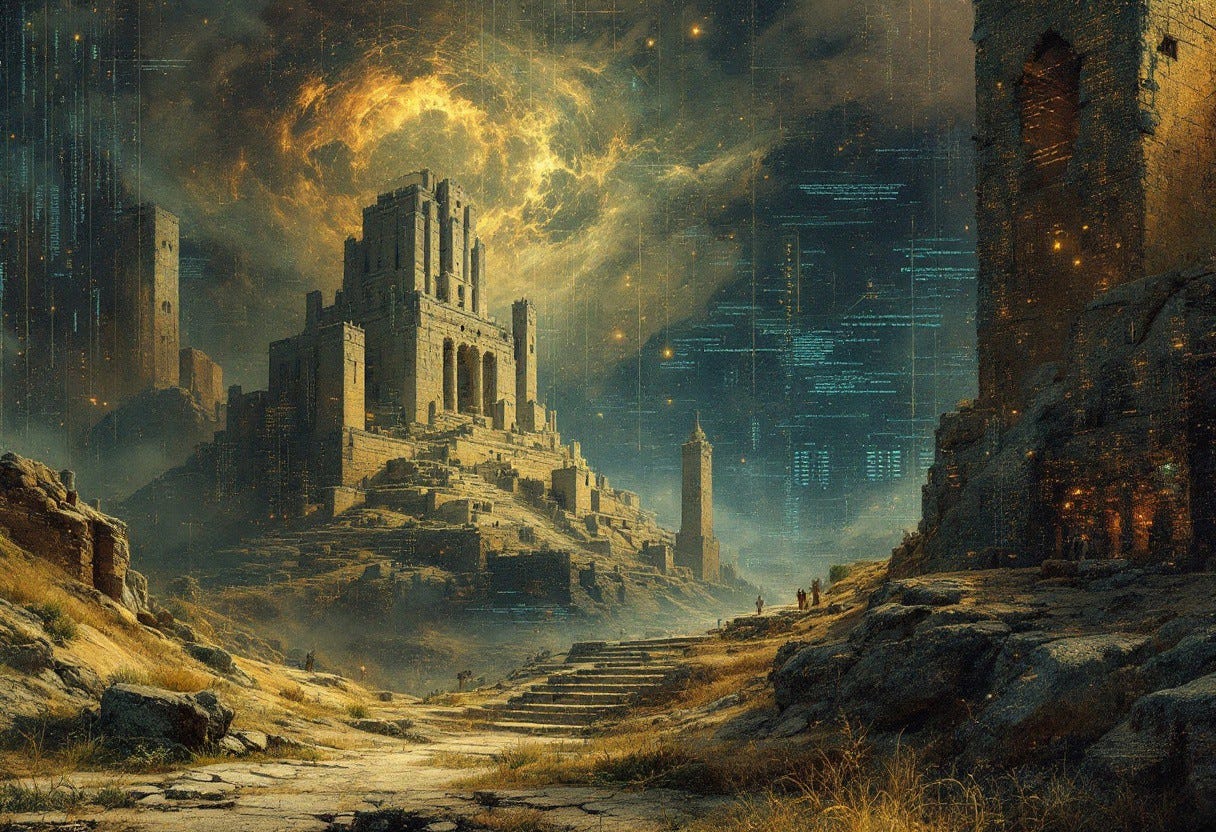From Genesis to AI
Simulation Theology and Language Models
I must admit a great gaping hole in my education: I’ve never read the Bible. I think I should read it because so much of Western culture is tied to it. But, reading it seems bit of a project. It’s like the empty canvas and a set of acrylic colors I have on the adjacent table. I really think that someday I should try to paint something. Or, the electric guitar, and the acoustic, collecting dust reclining on their respective stands. All these endeavors are waiting their turn behind writing this blog and the book, making electronic music, learning Italian on Duolingo (day 294!), trying to scrape a living, and even attempting to be half-a-decent husband, son, neighbor, and friend at times.
Yet one day, despite all this, I had a thought about the Bible. Maybe it’s obvious to everyone else—I don’t know—but on its face, the Bible seems to present a simulation theory (or simulation hypothesis). It’s the idea that our reality, including the universe and everything within it, is an artificial construct, akin to a highly sophisticated computer simulation created by someone or something—an advanced civilization, a higher-dimensional being, or perhaps the collective soul… It was popularized by philosopher Nick Bostrom and explored in science fiction like the 1999 movie The Matrix.
Simulation theory, in essence, proposes that our universe isn't quite 'real' in the way we perceive it. In Biblical terms, this would mean that God was the original programmer, and more recently perhaps more like the system administrator, and the help desk.
“In the beginning was the Word, and the Word was with God, and the Word was God.” That’s from the new testament. The phrase reminds me of something that Terence McKenna (1946–2000) said: ”The world is made of language.”
The whole cultural effort—at times outright culture war—that goes into maintaining and updating language seems to set humans apart from the rest of the creatures on this planet. People's thinking and, consequently, actions are results of language and the stories encoded in and by language. Institutions and identities are constructs made of language that ‘program’ how people act and behave, as I wrote in an earlier piece: “[ideology provides] a person with an identity within a narrative (e.g. a courageous soldier in an honorable war), and then the person is attracted to assume the identity (become a soldier) and fulfill the narrative (go to war) as a quest for personal significance, dignity, justice… something.” That is why the culture war is so much about language – which words should be used, how they should be used etc.
However, that’s only the slimy, sociological level of language. McKenna was thinking something deeper, something metaphysical. The full quote is: “The world is made of language. We can say that the world is composed of little demons doing calisthenics each one the size of a pissant's eyebrow*, or or we can say that the world is made out of wave-mechanical packets of matter flying along at the speed of light but notice that what we get each time is words.” (*For my Finnish readers: I love how this translates into ’kusiaisen kulmakarva’. I propose we adopt this phrase.)
McKenna was into ancient cultures, shamanism, mysticism, and psychedelics. But he also knew a great deal about the natural sciences. He had a lot of outlandish ideas, and a truly wonderful ability to tell stories and use language. He was a great entertainer, or perhaps 'artist' would be more appropriate. He knew he was out there, but that is the point of great art, to explore the unknown. He fashioned himself as ’Bard McKenna’, which is a nod to his Irish and Celtic roots and the centrality of storytelling.
Perhaps the most outlandish of his ideas is his take on the eschaton, by which he meant 'the transcendental object at the end of time' (I'm paraphrasing from memory, but I think I got it right). The visual impression this idea leaves in my mind is of a huge mandala humming at the very center of the darkness of space. McKenna's view was that world events, evolution, and reality (or the simulation) itself are not only pushed forward by causal forces stemming from past events but are also being pulled by an attractor in the future. That’s retrocausality (backwards causation) for you, and the attractor is the escathon, the transcendental object.
What's currently moving us to the edge of our seats? It's artificial intelligence, more precisely the Large Language Model (LLM), a mathematical innovation. The mathematical object (the LLM) is being sculpted and probed within data centers ballooning like mushrooms. It is expected to restructure the whole of economy and culture. It is a mathematical model of language and all knowledge—a summation of everything that has preceded —and, as such, it's coming pretty close to being a transcendental object at the end of time.
We don't have to get carried away to Cuckooland 😉 but it's fascinating how much truth and power lies in the simple statement that we live in a world made of language.
I’m writing a book on… eh, let’s call it social innovation. This blog expands on it, reflecting on news stories and current event. Subscribe to stay tuned—it’s free.
By subscribing to my Substack, you’ll get a monthly summary, but you won’t get any spam or separate notifications in email for each post.


